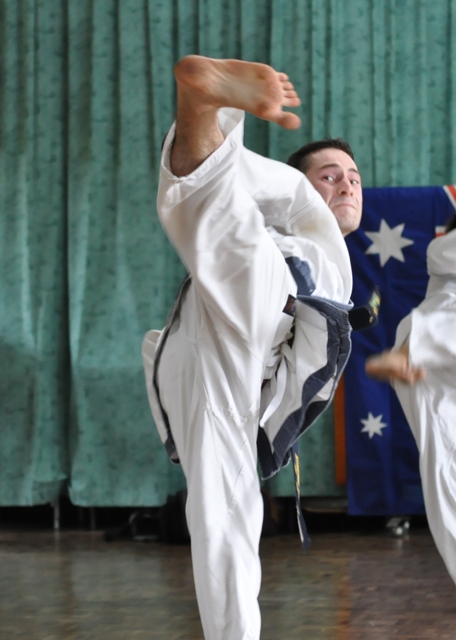
Whats best to eat before martial arts class?

Grandmaster Lee trained hard and was a dedicated student, attaining the rank of 2nd Dan in less than two years, and his 3rd Dan less than three years after that. In 1956, at about 20 years of age, he became the Moo Duk Kwan Tang Soo Do instructor at the Military Police HQ, Ma Po Gymnasium and Kon Gook University in Seoul. From 1957 to 1962, he also taught at the Korean Air Force Academy in Jin Hae City.
From 1964 to 1972, he distinguished himself as one of the true movers and shakers of the Moo Duk Kwan by becoming the Chief Instructor at the Choong Ang Dojang (the legendary Central Gymnasium) in Seoul and also served as the Director of the Korean Soo Bahk Do Association. In 1968, he served as the Chief Judge of the 1st World Tang Soo Do and 5th Asia Tang Soo Do Championships, in Seoul.
In 1972, Grandmaster Lee received his 7th Dan and also became the Chief Instructor for South East Asia, based in Malaysia. The following year, he founded the Brunei Tang Soo Do Association and the Singapore Tang Soo Do Association.
In 1974, he went on to found the Federation of Malaysia Tang Soo Do Organization, as well as the United Kingdom Tang Soo (Soo Bahk) Do Federation, where he continues as

Grandmaster Lee trained hard and was a dedicated student, attaining the rank of 2nd Dan in less than two years, and his 3rd Dan less than three years after that. In 1956, at about 20 years of age, he became the Moo Duk Kwan Tang Soo Do instructor at the Military Police HQ, Ma Po Gymnasium and Kon Gook University in Seoul. From 1957 to 1962, he also taught at the Korean Air Force Academy in Jin Hae City.
From 1964 to 1972, he distinguished himself as one of the true movers and shakers of the Moo Duk Kwan by becoming the Chief Instructor at the Choong Ang Dojang (the legendary Central Gymnasium) in Seoul and also served as the Director of the Korean Soo Bahk Do Association. In 1968, he served as the Chief Judge of the 1st World Tang Soo Do and 5th Asia Tang Soo Do Championships, in Seoul.
In 1972, Grandmaster Lee received his 7th Dan and also became the Chief Instructor for South East Asia, based in Malaysia. The following year, he founded the Brunei Tang Soo Do Association and the Singapore Tang Soo Do Association.
In 1974, he went on to found the Federation of Malaysia Tang Soo Do Organization, as well as the United Kingdom Tang Soo (Soo Bahk) Do Federation, where he continues as
You have to know that in order for your body and mind to work in tandem, you have to have the right kind of fuel for optimum results. Again, it depends on what kind of martial arts that you practice. If you practice a martial art with lots of rolls, falls and throw, you have to stop eating anything 2 hours before class (anything heavy 4 hours prior)...It would seem rude to throw up on the mat. The right kind of fuel is important only if you are on top. I am also an endurance athlete and I don't use any energy bars or sports drink (it only teaches your body to depend on outside source of energy rather than develops actual endurance skills). The difference at the dojo/center/hall is this: people who rely too much on food or drink for energy tire way faster and needs to refuel every hour or so. I can run 10 miles and practice full contact martial without much difficulties: actually being tired in class is a good thing because it forces your body to become economical and to rely on good technique rather than brute strength. It may seem counter intuitive at first but it's not. So my advice: eat light and plain.
Many of us are confused what should we eat before and after exercise.
I’ve prepared few short tips for you to resolve this mystery.
Pre-exercise:
Before working out it is important to eat something light. By light, I mean, you should avoid a large, protein, fiber and fat filled meal as it takes up to 4 hour to process such food. You should eat a light low-fat, low-sugar, low-protein, high carbohydrate meal. Carbohydrates will give you much needed fuel for efficient work out. Trust me, you’ll work out better and burn all of them. Eat proteins, your body will need to spend energy for processing food, you’ll workout won’t be as intense.
After Exercise:
Now your body needs raw materials to recuperate after your workout. The priority is to first replace any fluids lost during exercise. Replenish yourself with plenty of water and juice as soon as you finish exercising. (Easy on juice if you’re trying to loose weight as juices can be high on sugar.). The post-work out meal should contain some protein, some complex carbohydrates and some healthy fats too. Yes, carbohydrates again. Eating after exercise is important as well to restore glycogen and that can only happen with a meal containing both protein and complex carbohydrates.
Make sure you make smart choice of ingredients and don’t forget to drink plenty of water!
I am currently practicing Tang Soo Do, a Korean martial art. The movement is easier as compared to others (I sucked balls during my high school years in Karate). I am still a newbie. Haven't memorise all the movement yet. Have to work hard or risking self getting my buttcrack ripped.
Here's some introd--->

 |
Grandmaster Kang Uk Lee was born in Seoul, South Korea on August 24, 1936. At the age of 12, he became a member of the Moo Duk Kwan and began his training directly under Grandmaster Hwang Kee. Three years later, at the age of 16, he was awarded his First Dan (#70).
Grandmaster Mal Tae Kim
Grandmaster Mal Tae Kim (9th Dan ) came from South Korea to Malaysia about thirty years ago. He served in the South Korea Army for 4 years. His main task during that time was to train the South Korean army, Vietnamese army and the green beret (US marine) the Tang Soo Do art. After serving in the army he joined the police force and attained the rank of inspector before he retired.
During the younger days he learned Yudo and other Korean martial arts. He was often involved in street fights. Many of the techniques he learned in Tang Soo Do were tested by him during the fights.
He married a Korean girl whom bore him three sons. He personally trained all of his sons the art of Tang Soo Do and now they are all masters of this art (the eldest is 6th Dan and the two other sons hold 4th Dan black belt).
Sabah Mo Duk Kwan Tang Soo Do Association which was founded Grandmaster has about 3000 members mostly in the capital city of Sabah (Kota Kinabalu), Malaysia. However, only about 30 of the members are active in training. There are only a few black belts. High dans are even rare. There is only one 6th Dan (chief instructor: Mr. Alex Hi) and one 5th Dan (Assistant chief instructor: Mr. Francis Rimpau).